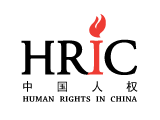Top Qs
Timeline
Chat
Perspective
Human Rights in China (organization)
International non-governmental organization From Wikipedia, the free encyclopedia
Remove ads
Human Rights in China (simplified Chinese: 中国人权; traditional Chinese: 中國人權; pinyin: Zhōngguó Rénquán) is a New York-based international, non-governmental organization (NGO) that addresses human rights and fundamental rights in China.[1][2] It is a member organization of the International Federation for Human Rights.[3][4] According to Fang Lizhi, HRIC adopts an independent and non-political approach.[5]
This article has multiple issues. Please help improve it or discuss these issues on the talk page. (Learn how and when to remove these messages)
|
Founded in March 1989 by Chinese students and scholars, HRIC provides analysis and information on human rights issues in China and advocates on behalf of individuals in China.[2][6][7] In 2005, HRIC was a Tech Award Laureate recognized by The Tech Museum of Innovation for its use of technology.[8]
HRIC has offices in Hong Kong and New York City.[9] It also hosts the Robert L. Bernstein Fellowship in International Human Rights, a program in partnership with the New York University School of Law.[10]
HRIC's Executive Director is Zhou Fengsuo (2023–present). Its former executive directors include Sharon Hom (2002–2023) and Xiao Qiang (1991–2002).
Remove ads
Activities
Summarize
Perspective
HRIC publishes reports and briefings on a range of human rights issues in China.[11]
The organization also addresses technological, legal, and administrative reform issues through individual advocacy as well as systemic and policy interventions. HRIC's programs and reports primarily focus on rights issues affecting China's rural population,[12] migrant workers,[13] ethnic minorities,[14] women,[15] and children.[16]
HRIC also translates some important law from Mainland China and Hong Kong to provides resources for civil society actors to support the promotion and exercise of fundamental rights. [17]
Domestic Advocacy
HRIC's work within China includes providing legal representation and assistance to activists.[18] HRIC collaborates with domestic Chinese groups and advocates for the Chinese government to reassess the 1989 Tiananmen Square protests and massacre.[19]
HRIC supports domestic groups such as the Tiananmen Mothers and facilitates connections between activists in China and international discussions, including efforts such as lifting the European Union arms embargo on China.[20] HRIC's online June 4 Archive documents the history of the 1989 Tiananmen Square protests and massacre.[21] It also maintains Fill the Square, an online petition supporting the Tiananmen Mothers' demands.[22]
International Advocacy
HRIC participates in discussions on human rights policies. It provides briefings and reports to the United Nations bodies, International Conferences, the WTO processes, and the EU-China Dialogue. As of 2006, HRIC had submitted over 40 cases of alleged human rights abuses to the UN subsidiary Working Group on Arbitrary Detention; 13 of these cases resulted in decisions, all of which deemed the detentions arbitrary.[23]
HRIC has outlined practices for IT companies operating in China regarding policies on the use of information technology and surveillance.[24]
Online Advocacy
HRIC operates a proxy server designed to circumvent the Great Firewall, providing access for users in China. It also publishes a bi-weekly journal.HRIC: [25] The project includes six websites featuring online Chinese publications and advocacy resources.
Remove ads
Ongoing publications
China Rights Forum is HRIC's bilingual semiannual journal. Since 1990, it has covered China's human rights developments. Articles are available online.
China Rights Forum is an online essay publication examining human rights issues facing China. It has not published any new content since 2015.
China Human Rights Biweekly (中国人权双周刊) is an online Chinese-language biweekly journal. It has not published any new content since 2020.
HRIC Daily Brief is an online selection of English-language Chinese human rights-related articles and commentary from news and other online media sources. It has not published any new content since 2022.
Remove ads
Funding
HRIC is funded by private foundations and individuals. It has received support from groups including the National Endowment for Democracy, Open Society Institute,[3] the International Center for Human Rights and Democratic Development, the European Human Rights Foundation, Human Rights Watch, and Asia Watch.[26][27] In 2006, the New York University School of Law established the Robert L. Bernstein Fellowship in International Human Rights, which supports a fellowship with HRIC.[28]
See also
References
External links
Wikiwand - on
Seamless Wikipedia browsing. On steroids.
Remove ads

